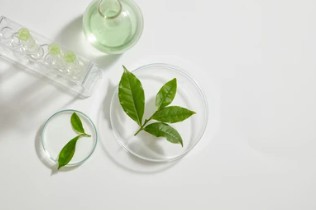
Plant extracts are one of the common types of raw materials used in food testing, cosmetic testing, pharmaceutical testing, health product testing, and feed testing. Tea extracts are active ingredients extracted from green tea leaves, including tea polyphenols (catechins), caffeine, aromatic oils, water, minerals, pigments, carbohydrates, proteins, amino acids, vitamins, etc. The bioactive abilities possessed by tea include immunomodulators, anti-genotoxic, anti-bacterial, anti-viral, and anti-diabetic, which have protective effects on human health. Due to the diversity of its components and benefits, tea can be used in various sectors. Therefore, for example, before tea can be used as a food additive, it is necessary to extract it to obtain its important compounds.
Plant extract testing is an important means of ensuring plant products, so the state has developed a strict quality control standard system for some common plant extracts, especially for applications in functional foods, food additives, cosmetics of plant origin, and other product extracts with very strict quality requirements. As a recognized leader in the field of tea testing, Lifeasible can develop the best solutions to test a wide variety of tea extracts, including but not limited to:
Tea extracts are derived from green tea leaves. We provide cutting-edge and reliable testing technology and test tea extracts in strict accordance with national standards, industry standards, group standards or local standards. The following are our tea extract testing items:
| Tea Extracts Testing Items | Main Representative Compounds | Testing Methods |
| Polyphenolic Extracts | Catechins (mainly including epigallocatechin, epigallocatechin, epigallocatechin gallate, and epigallocatechin gallate), flavonols, anthocyanins, phenolic acids, and several other components. |
|
| Flavonoid and Flavonoid Glycoside Extracts | Quercetin, kaempferol, yangmeiin, lignan, 3,4,5-trihydroxy-7-methoxyflavone, 3,4,7-trihydroxy-5-methoxyflavone, quercetin-3-O-glucoside, kaempferol-3-O-rutinoside, and 3,4-dihydroxy-5-methoxyflavone-7-O-β-D-glucopyranoside, etc. | |
| Phenolic Acid Extracts | Gallic acid, 2,5-dihydroxybenzoic acid, 2-hydroxybenzoic acid, 4-hydroxybenzoic acid, 3,4-dihydroxybenzoic acid, 1,3-benzenediol, 4-methyl-1,2-benzenediol, 1,2,4-benzenetriol, and methoxyphenols, etc. | |
| Terpenoid Extracts | Oleanolic acid, 3β-O-acetyl oleanolic acid, ursolic acid, rosmarinic acid, 2α,3α-dihydroxyursolic acid-28-O-β-D-glucoside, 3β,19α, 23-trihydroxy acids, arbutin, betulinic acid, 18-hydroxyursolic acid, α-tocopherol, etc. | |
| Alkaloid Extracts | Caffeine, theobromine, theophylline, deoxythymidine nucleoside, uracil riboside, uracil Caffeine, theobromine, theophylline, deoxythymidine riboside, uracil riboside, uracil, adenine, thymine, guanine, xanthine, hypoxanthine, mimetic xanthine, thymine deoxyribonucleoside, phenyl-β-naphthylamine, etc. |
We can perform tea extract testing not only in the quality control process but also in the related product market access license approval, product market cultivation, and research and development, and even in the equipment for manufacturing plant extracts to obtain data related to the production of extracts. Our services contribute to further research on tea chemical composition and provide a theoretical basis for better development and utilization of tea. If you are interested in our solutions, please contact us for technical consultation and quotation.
Lifeasible has established a one-stop service platform for plants. In addition to obtaining customized solutions for plant genetic engineering, customers can also conduct follow-up analysis and research on plants through our analysis platform. The analytical services we provide include but are not limited to the following:
July 13, 2024